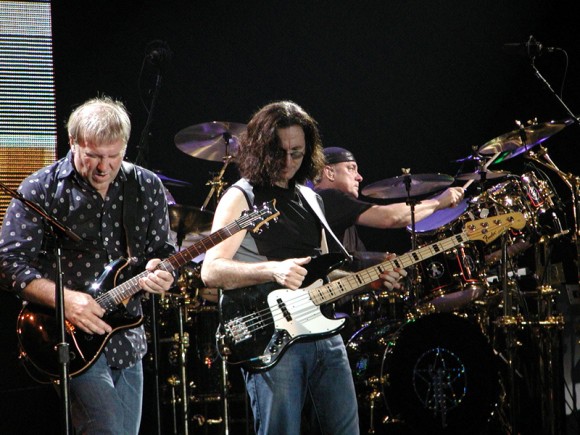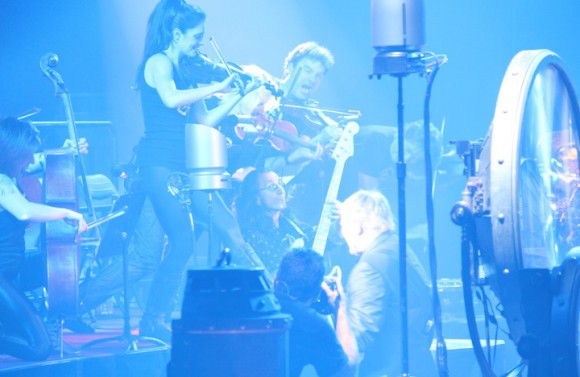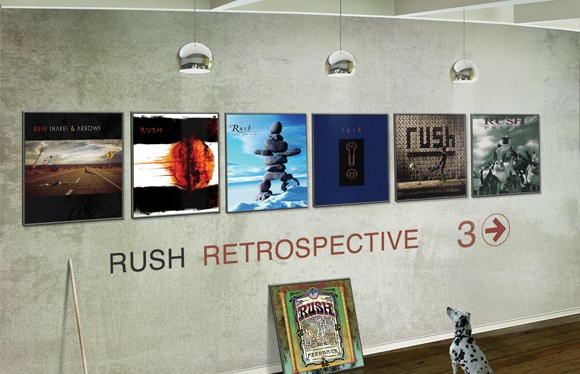aNewDomain — Rush have the most loyal following that any rock music band has ever known. Rush aren’t the most popular band ever, but their fans are the most loyal. This is why Rush are now known as “the world’s biggest cult band,” a serious title that matches this seriously cult-y bunch.
So what’s the band’s secret?
I’m one of the Rush loyal, so I have some insight into that question. The secret is that Rush is a culture. In itself.
As I write this, for example, Rush members have already headed out on what is, in all probability, their final major tour. That doesn’t mean their future is over — they are likely to record more studio albums and I fully expect brief live performances in the future, similar to the totally sold out five-night stint Rush did at Radio City Music Hall way back in 1983. That appearance supported the launch of the band’s then-latest album, Grace Under Pressure. I expect similar gigs to promote future studio albums.
But so far as months-long multi-city tours go, the present R40 Tour is likely it. That makes it a great time to elaborate a bit on what Rush culture is all about, why it matters and why you’d be wise to see Rush while you still can.
The Culture of Rush
With Rush, you’re practically obligated to take the music seriously and push yourself to the limits of your abilities. Rush percussionist Neil Peart has said that if he gets the privilege of living in a world that pays him big money to “hit things with sticks,” then he is obligated to hit things with sticks to the very best of his ability. All three band members are virtuoso musicians because of their relentless pursuit of excellence. They are perfectionists who are simply unwilling to just be regular rockers.
 Pushing artistic limits is a huge part of Rush culture. The fans get it from the musicians, that perfectionistic, aggressive pursuit of ultimate musicality.
Pushing artistic limits is a huge part of Rush culture. The fans get it from the musicians, that perfectionistic, aggressive pursuit of ultimate musicality.
This sense of pushing the limits to increase talent and ability is not limited to Rush or rock musicians.
But being the best you can be through willpower and practice is a hallmark of Rush culture and, as you will see below, it applies to all aspects of life.
No Whining
I cannot conjure up a negative Rush lyric. There’s a reason for this.
Rush lyrics don’t whine.
Rush lyrics never say such-and-such sucks and the songs don’t scream for entitlement. Even when Peart was writing his Ghost Rider era post-personal-tragedy lyrics, there was no whining, no sense that he thought life sucks or that he thought you should think life sucks, too.
Even when Rush lyrics have taken inspiration from death, tragedy, injustice, anger, fear or even rudeness (listen to “What You’re Doing”) there has never been anything that you could call “negative” conveyed or emoted.
Endless Evolving
What we can say about Rush musically is that the band began life as something sort of like a hybridized clone of Led Zeppelin and Cream. It didn’t stay that way for long. Rush began evolving from the moment they arrived on the scene, which is why evolution is the hallmark of their sound and another core part of Rush culture.
Think about it. Rush incorporated 1970s prog-rockin’ (not 1980s poppycockin’) Genesis qualities after their initial hard rock phase, and then moved on to achieve the perfect balance between heavy metal and the New Wave synth-drenched sound. Making their songwriting more concise, they then explored minimalism. After that period, Neil Peart got rid of one of his bass drums and the band added a touch of jazz, just to have that evolve into a sound that actively explored 21st century post-Grunge, before returning to the Rush roots by blending heavy metal with sci-fi themes but adding in classical strings.
 It has been a long evolution for The Guys At Work, to be sure. But throughout, their poetic lyrics and power trio basis remained at its core.
It has been a long evolution for The Guys At Work, to be sure. But throughout, their poetic lyrics and power trio basis remained at its core.
Yeah, that’s what we can say about the Rush evolution: The evolution of Rush defies labels. As should your own personal evolution.
Amazing Visuals
Long before MTV and post MTV media made graphical presentation core to musical success, Rush emphasized pure visual perfection.
Eraldo Carugati painted the Fly By Night cover for the band’s first album with Neil Peart in early 1975, but everything else since then has been designed or painted by Hugh Syme (often with Peart’s executive help). This long-standing relationship has allowed the development of an elaborate but cohesive portfolio of art which is a key part of Rush culture now and forever.
Great Literature, Deep Philosophy
Rush lyrics and conceptual themes are so deep and artistic that on one occasion they inspired a science fiction novel, which launched a now-famous author’s career! You can get a real education in music, art and literature just from listening to Rush. Reaching out past music and into such cultural depths is yet another hallmark of Rush culture.
And Funny …
Much maligned by rock critics throughout the 1970s and 1980s for having no sense of humor and being overtly pompous, Rush in reality have a wonderful, witty and self-mocking sense of humor. If you think otherwise, I know you never have seen them live.
You don’t have to look much further, really, than the ridiculous videos in which the band members are often actors. Then there are Geddy Lee’s patented goofy faces, Alex Lifeson rants (sadly, done no more) or stage props including operational washers and dryers and rotisseries subbing for Lee’s bass amps. Read the credits and liner notes and you’ll find Rush humor there, too. Self-mockery is a cornerstone of Rush and of Rush culture. Too bad, so sad, oh critics!
No Girls Allowed (?)
Heh … this notion is actually an extension of the above quality, the one about laughter and comedy. But once upon a time, by no intention of the band members, the fact that Rush was primarily a band of guys for guys was a reality.
The reality today is that male Rush fans find female Rush fans sexy, when they can find them. Only cool girls like Rush. Another Rush culture thing to love.
Baseball
Yes, baseball. Geddy Lee became such an avid baseball fan around 1980 that the band’s 1982 Signals album listed the band members and various production assistants with baseball fielding positions. Of course, if you don’t like baseball (the other two guys don’t care about it), you can always be avid about ice hockey.
Fine Food, Fine Spirits, and All Things Delicious
Oh, yes! Guitar player Lifeson is a chef and owns Toronto’s The Orbit Room restaurant. Likewise, Lifeson and Lee both collect wine and have very fine wine cellars. Peart is a connoisseur of The Macallan scotch. All in all Rush culture is about good, delicious things. Then there’s the magical soup. Check this out.
https://www.youtube.com/watch?v=zb-MwVUUy3g
Video: Dinner With Rush At a Hunting Lodge
A Love Of Wheels
Peart loves motorcycling so much that he has been traveling between shows on a motorcycle while on tour with the band since 2003. He has also been published in motorcycling magazines, which is just cool. His mechanical mind extends to cars, too, and every Rush fan knows the lyrical themes that center around cars or driving, most famous among them the song “Red Barchetta.”
Rush fans like cars. They like bikes. They like wheels. And wheels within wheels.
Hold Some Faith in the Goodness of Rush!
That’s a solid dose of Rush culture for you.
I suggest you see them live, on this last tour, and you’ll be a convert.
For now, I leave you with this:
Video: Rush R40 Toyota Center Houston, TX 2015 Full Show
For aNewDomain, I’m Brant David.
Images in order: Screenshot courtesy of Rush; Rush Live via Wikimedia Commons; Rush Live with Strings by Roberta Baker via Flickr














Great piece!
Love Rush.